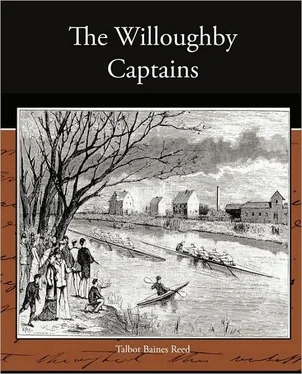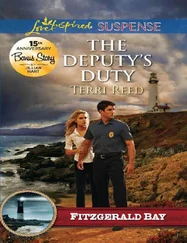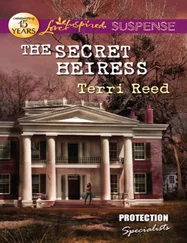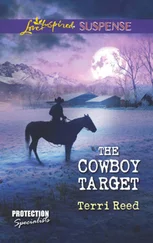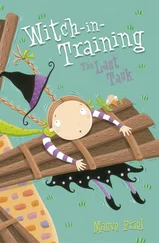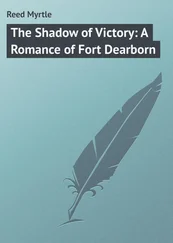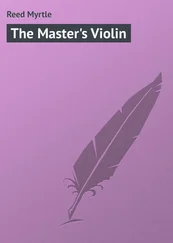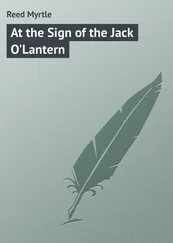What was their dismay, therefore, at the accident of that unlucky afternoon, and with what doleful faces did they present themselves in a melancholy procession at the door of his room at the appointed hour!
“Come in,” said Mr Parrett, who was still in his flannels, and had not quite done tea. “Oh, you are the boys that I met on the river this afternoon. All except one belonging to my house, I see.”
“Yes, sir,” exclaimed Telson, who was the distinguished exception, “they’re all Parretts except me, and it was all my fault, sir, and I’m—”
“No,” interrupted Parson, “it was all my fault; I was steering.”
“It was all our faults,” said Lawkins.
“Oh,” said Mr Parrett, who could not help looking a little amused at the eager faces of the young culprits. “Perhaps it was my fault for not looking where I was coming to.”
“Oh, sir,” said Parson, “that wouldn’t have been any good. We ran you down on purpose.”
“Eh?” said Mr Parrett, not quite sure whether he had heard correctly.
“That is, we didn’t know it was you, sir; we thought it was a schoolhouse—” (here Telson looked threatening)—“I mean we thought it was some one else. We wouldn’t have done it if we thought it was you, sir — indeed we wouldn’t.”
“No, sir, that we wouldn’t,” chimed in the chorus.
“And who did you think it was, pray?” inquired Mr Parrett.
“A schoolhouse fellow,” replied Parson, avoiding Telson’s glances.
“Which schoolhouse boy?” asked the master.
“Any one, sir. It didn’t matter much which.”
“Indeed. And what has the schoolhouse done to you?” said Mr Parrett, leaning back in his chair and pushing his plate away.
It wasn’t an easy question, but Parson felt something ought to be said.
“Some of them are rather cads, sir,” he said.
(“Parson,” whispered Telson. “I’ll fight you when you get outside.”)
“I mean, sir,” said Parson, hurriedly, “that is — (I beg pardon, Telson, old man, I didn’t mean) — they don’t like us, and—”
“And we don’t like them,” said Lawkins.
“And you think they ought to like you?” asked Mr Parrett, severely.
This was a poser. The Parrett juniors had never asked themselves the question before.
“Now listen to me,” said Mr Parrett. “I’m angry with you, and I’m going to punish you. I am not angry with you for capsizing me this afternoon. You did it by mistake, you say, and no harm was done. And I’m not going to punish you for being out late, for that the captain will do. But boys who make nuisances of themselves and then complain that other boys don’t like them are not to be put up with in Willoughby. You five have had a lesson already. You might have caused a much worse accident than you did by your folly. You may be thankful you did not. For a week neither of you is to go on to the river at all, and after that till the end of the term you will only be allowed to go with the captain’s permission, or in the company of a senior. You can go.”
The party turned to obey, when Mr Parrett added, “Three of you, Telson, Parson, and Lawkins, remain a moment.”
The other two went off, leaving their three comrades standing at the end of the table, wondering what on earth was coming next.
Mr Parrett’s manner changed as he turned to them. He became embarrassed, and spoke almost nervously.
“You three,” he said, “jumped in after me this afternoon, did you not?”
“Yes, please, sir,” said Telson; “Parson was first, sir.”
Mr Parrett rose from his seat, and, without saying a word, shook hands with each one of them, greatly to their astonishment and confusion.
“You can go now,” said the master, when the ceremony was concluded; “good-night, boys.”
“Good-night, sir,” said they, and filed out of the room.
It was some time before Parson and Telson, as they walked slowly back along the passage, could find words suitable to the occasion. Then Telson said, “Well, that was a rum thing of him to do!”
“What did he mean?” asked Parson.
“Goodness knows. But, I say, it’s a jolly soak being stopped the river, though.”
“Yes, and having to get a ‘permit’ when the time is up. I’d sooner not go on than beg a ‘permit’ of the captain.”
“I wonder what he’ll say to us to-morrow,” said Telson. “He won’t lick us, eh?”
“He’d better not,” said Parson. “You and I could lick him easy.”
“I suppose he’ll give us a howling impot. I say I’m getting fagged of impots. I’ve had four this week.”
“I’ve had three,” sighed Telson. “Heigho! Willoughby’s going to the dogs. I’ve a good mind to cut the whole concern.”
And so in rather desponding mood the two friends separated, and Telson had an exciting chase across the quadrangle to avoid two monitors who were prowling about there (as he concluded) for the express purpose of “potting” him.
In this, however, he was mistaken. The two monitors were Gilks of the schoolhouse and Silk of Welch’s, who were taking the air this hot summer evening, and thinking and talking of anything but Master Telson.
“I tell you,” said Gilks, “I detest the fellow.”
“You detest such a lot of fellows, Gilks,” said Silk.
“I know I do,” said Gilks, “but I hate Riddell more than the lot put together.”
“I should have thought he was rather an inoffensive duffer,” suggested Silk.
“That’s just the worst of it. I’d give anything to catch him out in anything that wasn’t quite square, just to pay him out for his sickening priggishness. Why,” he exclaimed, with increasing anger in his tone, “what do you think he did the other day, long before he was captain, or had any pretence to give himself airs? He pulled me up before all the fellows for — well, for using—”
“For swearing?” said Silk.
“Yes, if you like. For swearing. What business is it of his what I say? I should like to know.”
“Usen’t Wyndham to be down on fellows for swearing too?” asked Silk.
“Yes, he was,” said Gilks (who had good reason to know); “but he had a right to do it. This cub hasn’t.”
“What did Riddell say?”
“What did he say? He said it didn’t make what I said any better worth hearing for sticking in an oath, and that— Oh, I don’t know what precious impudence he didn’t give me.”
“Ha, ha,” said Silk, “it wasn’t bad. But I agree with you, the fellow is a prig—”
“I know I mean to make a stand now,” said Gilks. “He shan’t stick up his sanctimonious nose over us all, now he’s captain, if I can help it.”
“Why, what will you do?” asked Silk.
“Do! I’ll punch his head the first time he dare lecture me.”
“My dear fellow,” said Silk, “don’t be such a fool. You won’t do a bit of good by that. If you do want to pay him out, pay him out in his own coin.”
“How do you mean?” inquired Gilks.
“I mean, keep a sharp lookout till you catch his holiness tripping.”
“But the beggar never does trip. He’s so vilely careful, he never gives a chance,” growled Gilks.
“Awfully uncivil of him, when he knows how grateful we should be to him,” said Silk, laughing. “Never mind, old man, keep in with him if you can. Something’s sure to turn up. He won’t suspect you, as you’re in the schoolhouse; and we ought to be able to manage to put a spoke in his wheel somehow.”
“Wish you may do it,” said Gilks. “Anyhow, I dare say you are right; it’s no use flaring up too soon, if there is a chance of doing him. By the way, Fairbairn’s pretty nearly as bad as Riddell; they’re a pair, you know.”
“Yes, but Fairbairn’s in the boat,” said Silk.
Читать дальше
